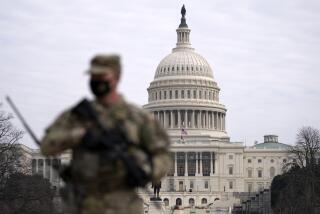House Approves Amendment to Weaken Anti-Terrorism Bill
- Share via
WASHINGTON — The House voted Wednesday to water down anti-terrorism legislation by killing provisions that conservatives claimed would have given federal law enforcement officers too much power and infringed on the constitutional rights of citizens.
By a margin of 246 to 171, members approved an amendment by Rep. Bob Barr (R-Ga.) that would forbid the use of wiretap evidence obtained without a warrant to prosecute alleged terrorists and others. The amendment would also make it harder to prosecute gun dealers and merchants who sold weapons and explosive materials to suspected terrorists.
With a vote expected today on the entire anti-terrorism legislation, Rep. Henry J. Hyde (R-Ill.) and other supporters protested that Barr’s amendment guts the bill and makes it unworthy of its name.
“This is no longer a real anti-terrorism bill,” said Hyde, chairman of the House Judiciary Committee, which drafted the bill. Added Rep. John Conyers Jr. (D-Mich.), the committee’s ranking minority member: “We have just eviscerated the heart and soul of the anti-terrorism bill.”
Barr’s proposal, the most important of more than a dozen amendments considered by the House, was approved by 178 Republicans and 68 Democrats. Many conservatives objected to new powers for law enforcement agencies in the wake of congressional findings that authorities had overstepped their bounds in the 1993 siege of the Branch Davidian compound near Waco, Texas, in which more than 80 people were killed, and the 1992 Ruby Ridge, Idaho, shootout in which a federal marshal and the wife and son of an anti-government survivalist were shot to death.
Some liberal Democrats who supported Barr’s move said they were concerned about the bill’s effect on civil liberties. Conservatives like Rep. Dan Burton (R-Ind.) said that granting law enforcement the right to use warrantless wiretap evidence, when obtained in good faith, would nonetheless “expand their ability to wiretap and spy on individuals in this country.”
But Hyde and other advocates of strong anti-terrorism legislation said that tough measures are needed, even though they had sought to compromise with opponents during months of negotiation.
After the bombing of the federal building in Oklahoma City last April, President Clinton asked Congress to pass anti-terrorism legislation promptly. The Senate approved a bill last June, 91 to 8, but legislation has been stalled in the House for months.
More to Read
Get the L.A. Times Politics newsletter
Deeply reported insights into legislation, politics and policy from Sacramento, Washington and beyond. In your inbox twice per week.
You may occasionally receive promotional content from the Los Angeles Times.










